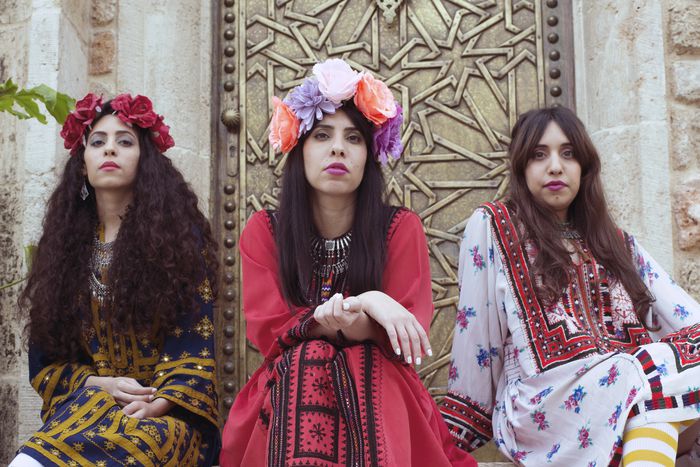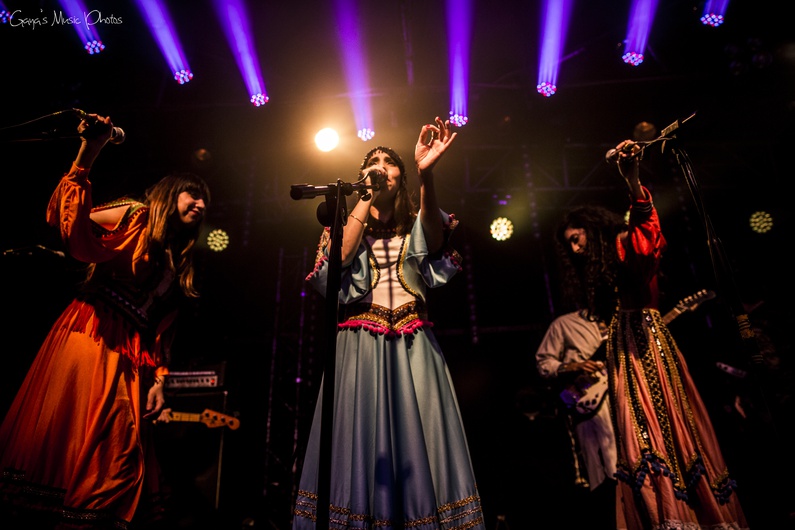
A-WA: Three sisters in perfect harmony
Published on
Translation by:
Arwen DeweyThe music of the Haim sisters draw on many different styles: Yemeni, Israeli, feminine, traditional, modern... They flawlessly display their mastery of the multicultural medley on their bewitching first album, Habib Galbi. Here, we paint a portrait of this musical triptych.
In conversation, the three Haim sisters' voices blend together as smoothly as they do in song. Tair, the eldest sister, provides the starting note: "Our music is a combination of folk and..."
"...Yemeni folk," adds Liron, 2 years younger than Tair, "Mixed with electro and hip hop."
"And newer rhythms,” Tair elaborate, “It’s a mix of past and present."
"It's the feeling of sorrow expressed through joy,” concludes Tagel. At 26, she is the youngest member of a group which defies definition. This explosive mix of styles provides the fresh new flavours heard on Habib Galbi, A-WA's debut EP.
Settled comfortably in a Parisian apartment near Sacre Coeur, the group's originality also exudes from their appearance. Just like during performance, they are wearing long, traditional dresses, while their iPhones remain in easy reach. They are quick to praise Parisian women's sense of style, whilst also bragging about Tel Aviv hipsters. The conversation includes references to the places of their childhood: the Sinai Peninsula's Arava Desert, Saudi Arabia, and Jordan. The cultural crossroads is perfectly balanced.
Keeping it in the family
Tair is sat in the middle spot on the sofa, naturally. It's clear that the oldest sister is the ringleader.
"She's very charismatic," her sisters explain, sat on either side, "She has that thing that leaders have. Plus she's funny! And she’s good at improvising."
But no one member seems left out. According to her elder sisters, Tagel is the band's creative genius, "She's got a good ear, and listens to music intelligently. You're clever!" Liron tells her.
"She's brilliant," Tair insists, teasing her littlest sister.
Meanwhile Liron – in her own words – "Takes care of the group's positive energy."
"She's organized and stubborn, but in a good way," add the others, through big, lipstick smiles, "When she wants us to do something, we dive right in."
When they’re making music, the same roles apply: Tair sings lead, Tagel covers the high notes and Liron the low. The A-WA sisters complete each other’s artistic sentences, just as they do in conversation.
 Coming from a family of six, these ebony-haired women are used to sharing the family spotlight. "Where we come from, everyone is a musician," they explain.
Coming from a family of six, these ebony-haired women are used to sharing the family spotlight. "Where we come from, everyone is a musician," they explain.
They hail from Shaharut, a village "on a mountain" in southern Israel. "There were only 30 families there,” Tagel reminisces, “We lived with goats, chickens and camels; sort of like Little House on the Prairie." They often played outside, that is when they weren't playing music with the rest of the Haim clan, their father watching, video camera in hand.
Their hobby soon evolved into a professional goal. “We knew, from a very early age, that we wanted to be singers. So we needed to learn the language of musicians, to be able to communicate with them," Tahir explains. Starting in primary school, the trio took music classes, continuing into secondary school with voice coaching, piano and dance lessons.
Tair went to Tel Aviv to complete her education. She returned home four years later with a degree in music and big plans to become an international success. The three sisters started experimenting again, just like they had as children, and posted the videos on YouTube.
They soon decided to get serious. With a few very clear requirements in mind, they started looking for a producer. "We wanted someone who understood our groove, and the beauty of Yemeni music, as well as the passion we feel for it. It had to be someone who had already been successful in their work and who travelled a lot. Above all, we wanted someone we could truly admire."
That man turned out to be Tomer Yosef, lead singer of Balkan Beat Box. In 2013, the women that would soon become A-WA sent him a confident message along with several demo tapes. Their connection was instantaneous. The multi-talented musician was blown away, and immediately took them under his wing. A series of concerts in Israel and Europe followed, along with the production of a quirky, flamboyant music video, the beginnings of a media frenzy, and the release of their hypnotic debut album on the 6th of November.
A-WA - « Habib Galbi ».
Tradition for today
The Haim sisters speak Hebrew amongst themselves. For this interview they spoke English, and even tried some French; but for their album they chose to sing in an Arabic dialect that they don't speak fluently. A-WA’s members are the granddaughters of immigrant Yemenite Jews. They have reworked old songs created by the women of that community in order to pay tribute to these origins.
"They couldn't read or write, so they made up songs and passed them from woman to woman. It was the only way they had of expressing themselves,” explains Tair, smoothing down her patterned dress. The trio decided to continue that oral tradition; with added keytar, drum kit, sampling and bass. "Some people think that traditions mustn't be tampered with. It's a very closed-minded was of seeing things," Liron explains, "We want to open people's minds."
"Yes, and their ears, and their hearts!" adds Tair enthusiastically, as the rest of the group nods, "We are Israeli, we are Yemeni, we are lots of things, and we want to unite all of these parts of ourselves, all of our different cultures."
Lots of people seem ready to cross the bridge they're building. In their own country, despite religious tensions, this Arabic-singing trio are being welcomed with warmth and curiosity. They have also received encouraging messages from Yemen, such as "Thank you for sharing our culture with the world," and "You bring us comfort and courage in these difficult times."
"It's very moving, and so important to us to be valued back home," say the three artists. They are proud to be reclaiming their heritage. In their hometown of Shaharut, that pride is shared. Even their grandmother, who virtually stopped speaking her Yemeni dialect when she arrived in Israel in 1949, has now started speaking Arabic again. That’s unity through music.
 ---
---
This article was contributed by La Parisienne de cafébabel.
Translated from A-WA : en parfaite harmonie



